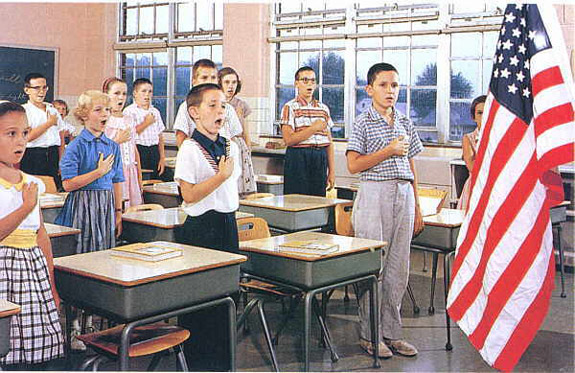At approximately 7:32am every weekday morning at my son’s elementary school something beautiful happens. Immediately after morning announcements about 800 little people all over the school place their right hand over their heart and say in unison, the Pledge of Allegiance. Some say it while they are yawning. Others don’t know all the words. Few, if any (at their tender age), can truly appreciate what it means. But they all say it.
I pledge allegiance to the flag of the United States of America, and to the republic for which it stands, one nation under God, indivisible, with liberty and justice for all.
Changed four times since it was created in 1892, those 31 words penned by Francis Bellamy require us to do something that we rarely do – pledge an allegiance.
Most Americans are fiercely loyal to their country. Perhaps it is because we recognize the many freedoms and blessings we enjoy that the rest of the world does not. Perhaps it is because of our military dominance. Maybe it’s because of our beautiful landscape or caliber of citizens? For some, the luxurious ammenities make our country the greatest (indoor plumbing, hot showers, on demand electricity, high speed internet, The Bachlorette, etc.). While all of those reasons may be true – I’m starting to wonder if there is another, more subtle reason for our loyalty – the pledge.
Most of us grew up reciting the pledge of allegiance in school. Every single day for 13 years, I stood at attention, stared at the Stars and Stripes and said the pledge of allegiance – to “the flag of the United States of America and to the republic for which it stands.” As I was reciting the pledge again in my son’s class, I pondered my own verbal commitment to my country. It shouldn’t surprise me that I’m an intensely loyal American. Afterall, I calculated that I recited the pledge over 2300 times from kindergarten to graduation. I think if I pledged allegiance to cottage cheese 2300 times, I’d be just as loyal.
I began to think about what other areas of life require a significant pledge from me, as an adult. I could think of only three two:
The pledge to order Thin Mint cookies from the Girl Scouts. I consider it my civic duty to purchase and consume several boxes a year.- The pledge (aka public declaration) of my faith
- The pledge (aka vows) of my marriage.
Think about our typical declaration of faith. At the end of their sermon, many preachers ask everyone in the sanctuary to close their eyes, bow their heads and raise their hands to “choose Christ.” Under a cloud of secrecy, no one else present is allowed to see who is making a profession of faith with their silently raised hand. In such an environment, it makes one feel as if they should be embarrassed about their decision.
There are some churches who recite the Apostles Creed every Sunday. That would be the closest thing we have to a Christian pledge. But I would venture to say that most self-proclaimed Christians could not recite it from memory. Even if they do know it, they don’t say it daily. Even so, it’s not a pledge as much as it is an itemized list of beliefs. It simply states what a Christian is supposed to believe. It is a far cry from a pledge to act out on those beliefs.
Why is the state of Christianity so sad in America? For starters, I’ll be the first to admit – it’s because of me. People who do a poor job of living out what they say they believe. Perhaps if Christians had a daily pledge of allegiance and it was done verbally, publicly and daily – we’d have a nation of stronger believers?
Consider the pledge we make in marriage. Though there are many private “I love yous” throughout the course of a relationship, there is really only one time designated to stand up and publicly pledge that love – the wedding ceremony. If we are honest, most couples do not watch their wedding video or review their vows as a reminder of their commitment. We promise to be faithful. We promise to never leave. We promise that no matter what happens – we will work it out. Such lofty promises, rarely repeated again. Based on the prevalent and growing divorce rate in our country (even among Christians who “know better”), I think it is safe to say – one pledge one time is not enough.
What would happen to marriages across the land if – every day – spouses repeated the vows made to each other, some 5 years ago? 15 years ago? Even 50 years ago?
I think we’d have stronger marriages and as a result, stronger families.
What would happen to the state of Christianity in America if every true Christian said a daily pledge to be faithful to their God?
I think we’d also have stronger Christians and stronger churches.
And if we had stronger families and stronger churches, we’d have a stronger nation. Who doesn’t want that?
